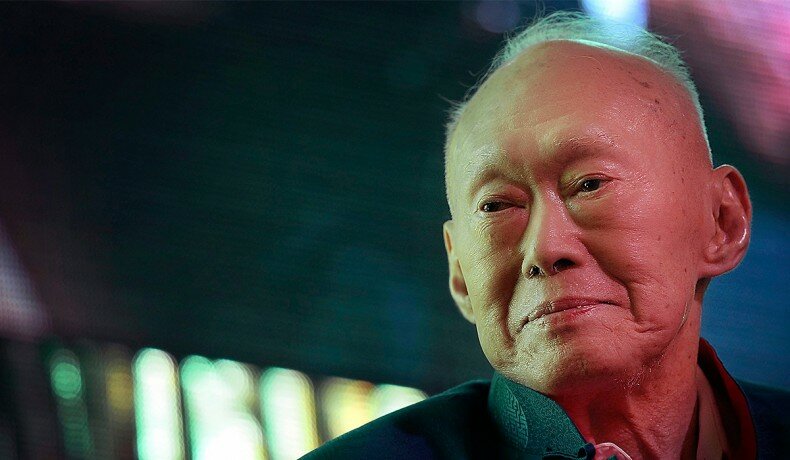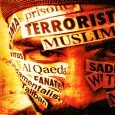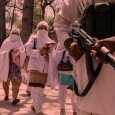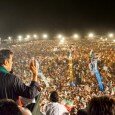By Mubashir Noor –
The one lesson Pakistan can learn from Singapore’s journey is that, sometimes, a single individual can be the difference, where a hundred narcissists will not
On March 23, 2015, Lee Kuan Yew, Singapore’s political monolith, founding father, and chief architect of the Asian economic miracle, passed on at age 91. Lee leaves behind a country he marshaled from third-world sandlot to a global economic powerhouse in three decades, and many lessons for Pakistan on how unlikely ideas sometimes work out really well.
The man US President Obama calls “a true giant of history” eschewed western democracy for Spartan pragmatism, and by the early twenty-first century, had led Singapore to a per capita GNP higher than its ex-colonizer, Great Britain.
 Many parallels can be drawn between the Singapore and Pakistan stories. For starters, both countries were birthed in fractious circumstances. Like the painful division of the Indian subcontinent, Singapore emerged from decolonization as part of the Malay Federation, but was subsequently kicked out in 1965. Amid race riots between Singapore’s Chinese and the Malay majority, and widening ideological differences with Lee’s – People’s Action Party (P.A.P), the government ditched the colony to its own devices. To this day, akin to the India-Pakistan rivalry, Singaporeans are mindful of their vulnerability as a Chinese-majority Island surrounded by Indonesia and Malaysia.
Many parallels can be drawn between the Singapore and Pakistan stories. For starters, both countries were birthed in fractious circumstances. Like the painful division of the Indian subcontinent, Singapore emerged from decolonization as part of the Malay Federation, but was subsequently kicked out in 1965. Amid race riots between Singapore’s Chinese and the Malay majority, and widening ideological differences with Lee’s – People’s Action Party (P.A.P), the government ditched the colony to its own devices. To this day, akin to the India-Pakistan rivalry, Singaporeans are mindful of their vulnerability as a Chinese-majority Island surrounded by Indonesia and Malaysia.
Whereas Jinnah’s two-nation theory set up our geographical split, Singapore only had Lee Kuan Yew’s willpower to shape the country’s future. In a 2007 interview, he said: “to understand Singapore, you’ve got to start off with the fact that it’s not supposed to exist and cannot exist.” In Pakistan, Islam became the banner under which its diverse ethnicities could coexist, but Singapore’s population was a volatile mix of Chinese, Malays and Indians; people without a common language, culture or destiny. Also unlike Pakistan, Singapore had no natural resources of note, and its major industry as a colonial naval base disappeared with the Britons.
Singapore’s ideology, then, emerged from simple self-preservation. When American-style democracy was the cause du jour, Lee Kuan Yew made an about face towards “soft” authoritarianism. Unlike Pakistan’s detours to dictatorship, his overriding caveat was tangible economic results. Lee focused on “does it work? If it works, let’s try it. If it’s fine, let’s continue it. If it doesn’t work, toss it out, try another one.” Liberal democracy made him uneasy because it championed the rights of individuals over an orderly society. To him, this notion fundamentally separated the Orient from the Occident.
 Lee’s eastern values insisted that a well-ordered society was paramount to prosperity and impossible when an individual had the right to behave as he pleased. That’s why even though he considered American democracy indispensable to a peaceful world, he could not reconcile with its laissez-faire perils. Lee could also be heavy-handed with political opponents and dissidents alike, prompting writer William Gibson to call Singapore a “Disneyland with the death penalty.” He always defended the P.A.P’s single-party rule, or “meritocracy,” by saying that Singapore did not have the numbers for multiple “A-Teams.”
Lee’s eastern values insisted that a well-ordered society was paramount to prosperity and impossible when an individual had the right to behave as he pleased. That’s why even though he considered American democracy indispensable to a peaceful world, he could not reconcile with its laissez-faire perils. Lee could also be heavy-handed with political opponents and dissidents alike, prompting writer William Gibson to call Singapore a “Disneyland with the death penalty.” He always defended the P.A.P’s single-party rule, or “meritocracy,” by saying that Singapore did not have the numbers for multiple “A-Teams.”
Lee Kuan Yew’s Singapore flouted the accepted convention that growth, prosperity and freedom went together. Even as critics bemoaned his father-knows-best attitude towards society, including the infamous chewing gum laws, they couldn’t argue with the results. US President Nixon was a big fan, and once speculated that in another time and place, Lee might have “attained the world stature of a Churchill, a Disraeli, or a Gladstone.” The communist Chinese were also smitten with his brand of capitalism, which stressed the role of government over a free market, and used this blueprint for their own economic turnaround.
Lee lifted Singapore’s economic fortunes by focusing on its one asset: the intelligence and industry of the people. For starters, his P.A.P brought the nation’s best and brightest into the fold. To remove the temptation for corruption, civil servant salaries are competitive with those of leading professionals in the private sector. He also had a great eye for economic managers, such as Albert Winsemius, who kept government small, the economy open and regulations simple and transparent. Consequently, Singapore often leads the World Bank’s “ease of doing business” rankings, and its harbor processes up to 40% of global maritime trade.
 From the early years, Singapore hustled for foreign investment despite the prevalent Asian wisdom. Multinationals were seen as evil personified, exploiting the third-world’s cheap land, labor and raw materials. Lee, however, encouraged them to invest in his country with attractive fiscal incentives. He was also big on experts, and sought them out regardless of nationality. After its independence in 1965, Singapore urgently needed an army to defend itself from Malay Ultras, but India and Egypt declined to help. Seeing this, Lee went straight to the Israelis, despite the fear of agitating Singaporean Muslims.
From the early years, Singapore hustled for foreign investment despite the prevalent Asian wisdom. Multinationals were seen as evil personified, exploiting the third-world’s cheap land, labor and raw materials. Lee, however, encouraged them to invest in his country with attractive fiscal incentives. He was also big on experts, and sought them out regardless of nationality. After its independence in 1965, Singapore urgently needed an army to defend itself from Malay Ultras, but India and Egypt declined to help. Seeing this, Lee went straight to the Israelis, despite the fear of agitating Singaporean Muslims.
The one lesson Pakistan can learn from Singapore’s journey is that, sometimes, a single individual can be the difference, where a hundred narcissists will not. We’re invested in parliamentary democracy, of course, but being rigid about the future is something Lee never did. For 68 years, democracy has been the best revenge on us all, for voting a long line of incompetents into office. Though Mr. Yew was not a practicing theist, I pray his next incarnation is on Pakistani shores. We sure could use his kind right now.
The writer is a freelance columnist and audio engineer based in Islamabad































































































